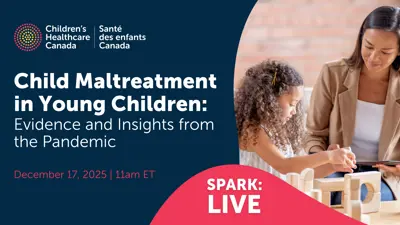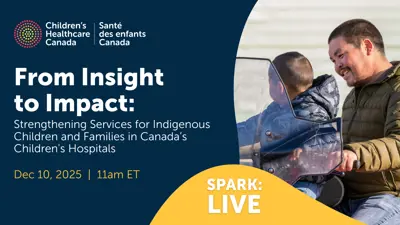- December 18 | Advancing Youth Suicide Prevention: Learning Across Borders
- December 17 | Child Maltreatment in Young Children: Evidence and Insights from the Pandemic
- December 10 | From Insight to Impact: Strengthening Services for Indigenous Children and Families in Canada's Children's Hospitals
- November 20 | Advancing a National Vision for Child Health: Highlights from the National CHILD Town Hall
- October 29 | Easing Pain, Improving Lives: A New Pathway for Children with Neurological Impairments
- October 15 | Gender-Affirming Care for Youth: Essential knowledge for healthcare providers (No recording available)
- September 24 | Autism Diagnosis and Care: Insights from Canadian Community Physicians
- June 25 | Supporting Parents with Trans, Two-Spirit, and Non-Binary Youth: The role of healthcare providers in promoting family acceptance (No recording available)
- June 4 | Revolutionizing Pediatric Care: A Scoping Review of Synchronous Virtual Care Approaches
- June 1 | Vaccinate & Up to Date: Bridging the gap in routine pediatric immunization
- May 7 | Communication Matters: Lessons from pediatric palliative care
- April 30 | Addressing Health Misinformation in Gender Affirming Care (No recording available)
-
March 26 | Deciding on Virtual Care: Learning from Youth with Pain, Caregivers, and Health Professionals
- January 29 | Building Bridges: Essential supports for children with disabilities and their families in schools, healthcare, and community
- January 22 | Engage, Educate, Empower: Co-Designing a Digital Tool for Youth Mental Health Literacy
SPARK: Live
SPARK: Live
Children's Healthcare Canada's SPARK: Live webinars provides you access to cutting-edge research and other evidence (practice, policy, leadership, and lived experience) in child and youth health and healthcare, innovations from across the child healthcare continuum, and subject matter experts and colleagues from Canada and around the world.
Webinar Archive
- December 11 | Lessons learned during the pandemic: Lighting the way to build better healthcare transition programs
- December 4 | COVID-19 Restrictions and the Surge in Eating Disorders Among Youth in Canada
- September 11 | Quality Community-Based Autism Care in Canada: Scaling-up ECHO AuDIO
- June 12 | Navigating EDIT-CP (Early Detection and Intervention Toolkit for Cerebral Palsy) for Primary Care Physicians, Rehabilitation Specialists and Caregivers
- May 1 | Enabling active play for children with medical conditions or disabilities: Resources for families and clinical settings
- April 24 | Acute Health Care Use & Access among Canadian Children During the Pandemic: Lessons Learned
- March 20 | Achieving Vaccine Equity for Children and Youth
- February 28 | Youth in Pain - Solutions for Effective, Safe, and Equitable Medical Use of Opioids for Pain in Youth
- February 21 | Let’s Talk Disability and Sex! The power of co-creation and knowledge mobilization to meet the needs of pre-teens with disabilities
- January 10 | Caring for Kids: Insights from Three Canadian Hospitals on ChildKind Certification




